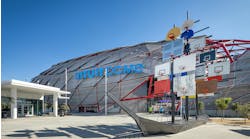Latest from Green
Sponsored
Atlanta - A proposed standard that essentially will define high-performing buildings in code-intended language is one step closer to completion.
Proposed Standard 189.1, Standard for the Design of High-Performance Green Buildings Except Low-Rise Residential Buildings, is now open for its second public review.
The proposed standard will provide minimum requirements for the design of high-performance new commercial buildings and major renovation projects. The standard will address energy efficiency, a building's impact on the atmosphere, sustainable sites, water use efficiency, materials and resources and indoor environmental quality. It is being developed by ASHRAE, the Illuminating Engineering Society of North America and the U.S. Green Building Council.
“This standard is an energy-saving stepping stone toward ASHRAE's goal of net-zero-energy buildings,” said John Hogan, chair of the committee that wrote the standard. “This is a goal that IESNA and the USGBC support as well as partners in this standard's development. It also gives building owners or jurisdictions that voluntarily choose to adopt the standard a tool for constructing truly high-performing buildings that provide energy-efficient, safe and comfortable environments for occupants.”
By applying the minimum set of prescriptive recommendations, Standard 189.1P leads to site energy savings ranging from 10% to 41% over Standard 90.1-2007, including plug and process loads and all other energy consumption for the building, with an average of 24.9% for all climates.
The proposed standard also provides indoor water savings of 35% for an office building and 26% for a multifamily building.
The indoor air quality criteria have been coordinated with ASHRAE's IAQ Design Guide (under development), and the commissioning criteria have been more closely aligned with ASHRAE's commissioning guidelines. The first public review generated 900 comments.
Proposed ASHRAE standards, guidelines and addenda to standards are available only during public review periods. The public review began Feb. 22 and ends April 7, 2008. Additional information is available at www.ashrae.org/publicreviews.

